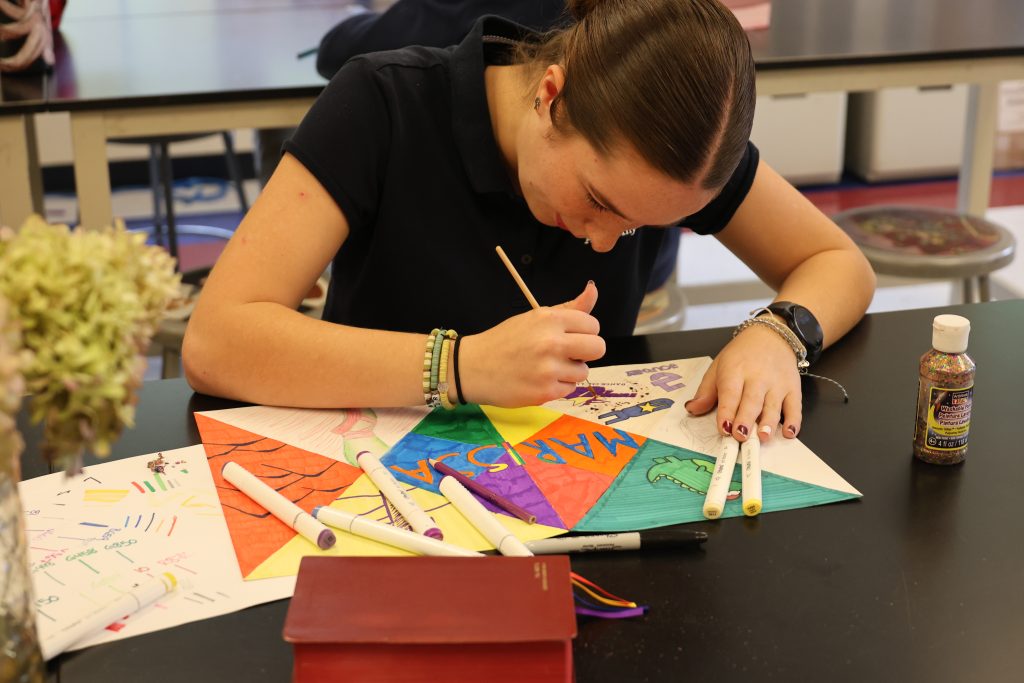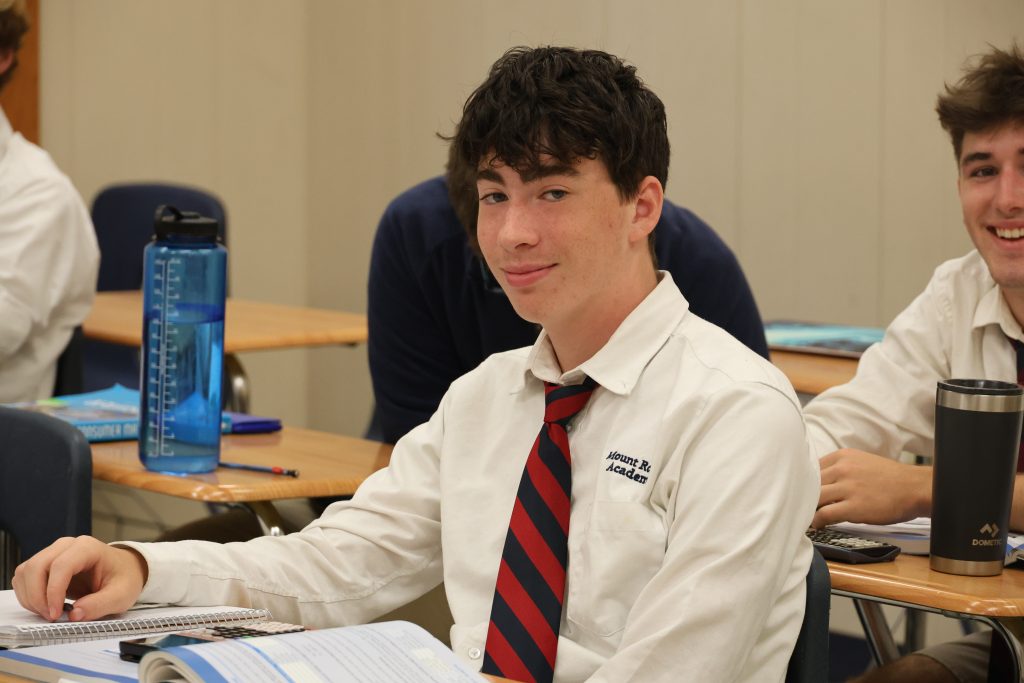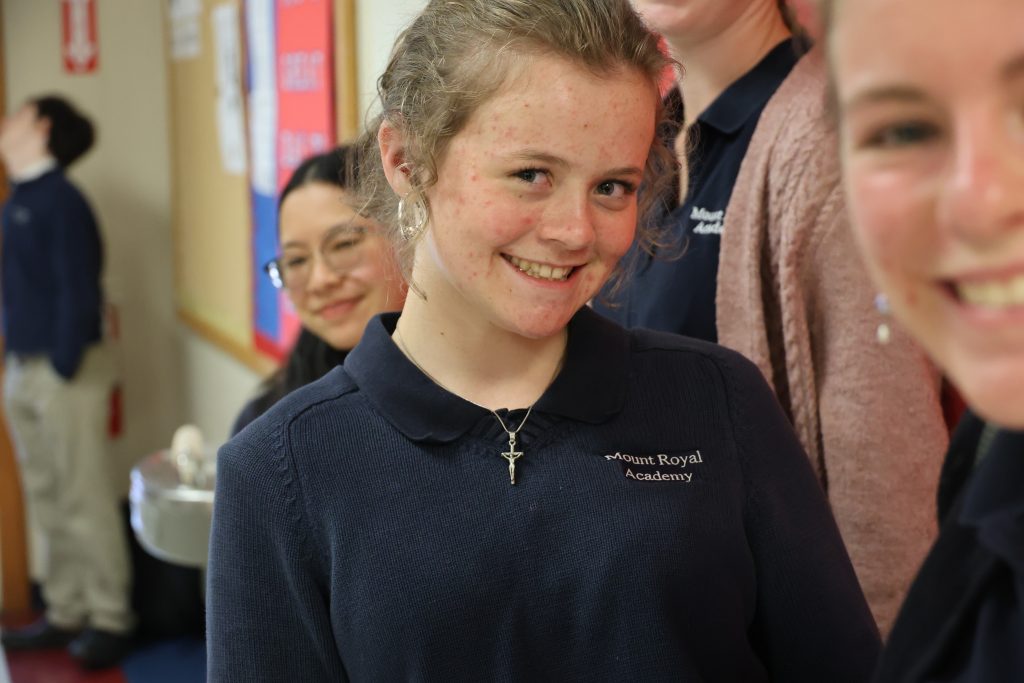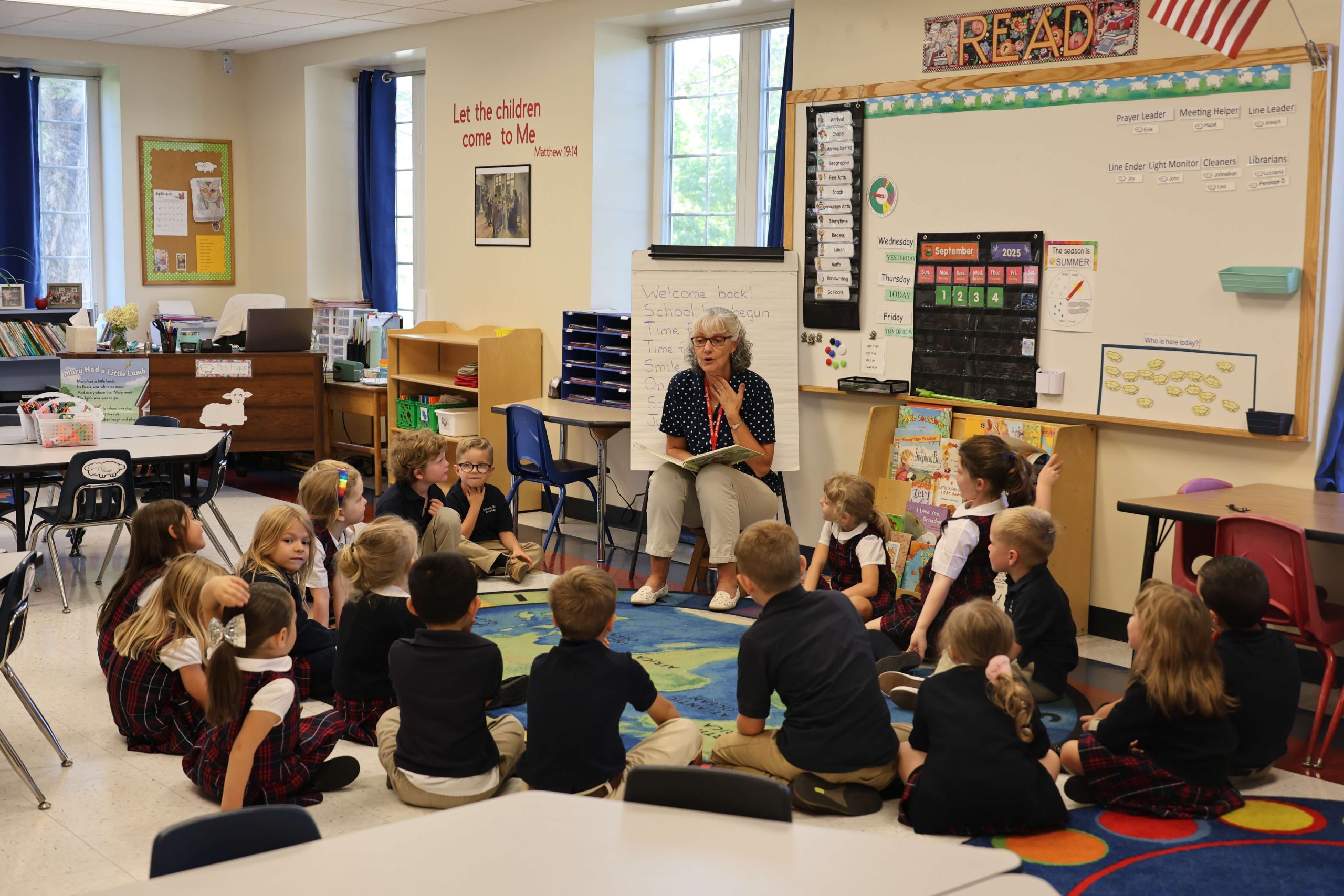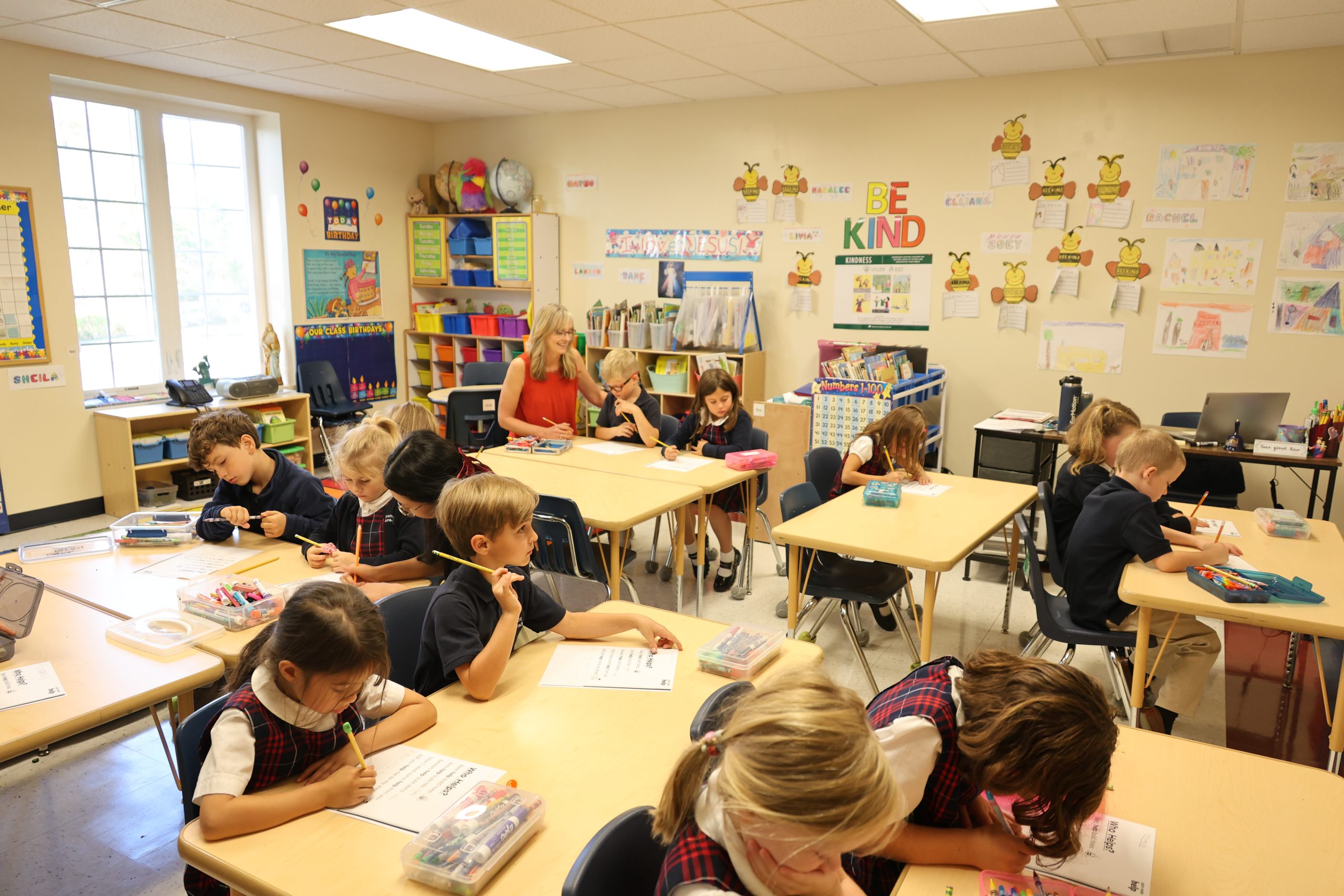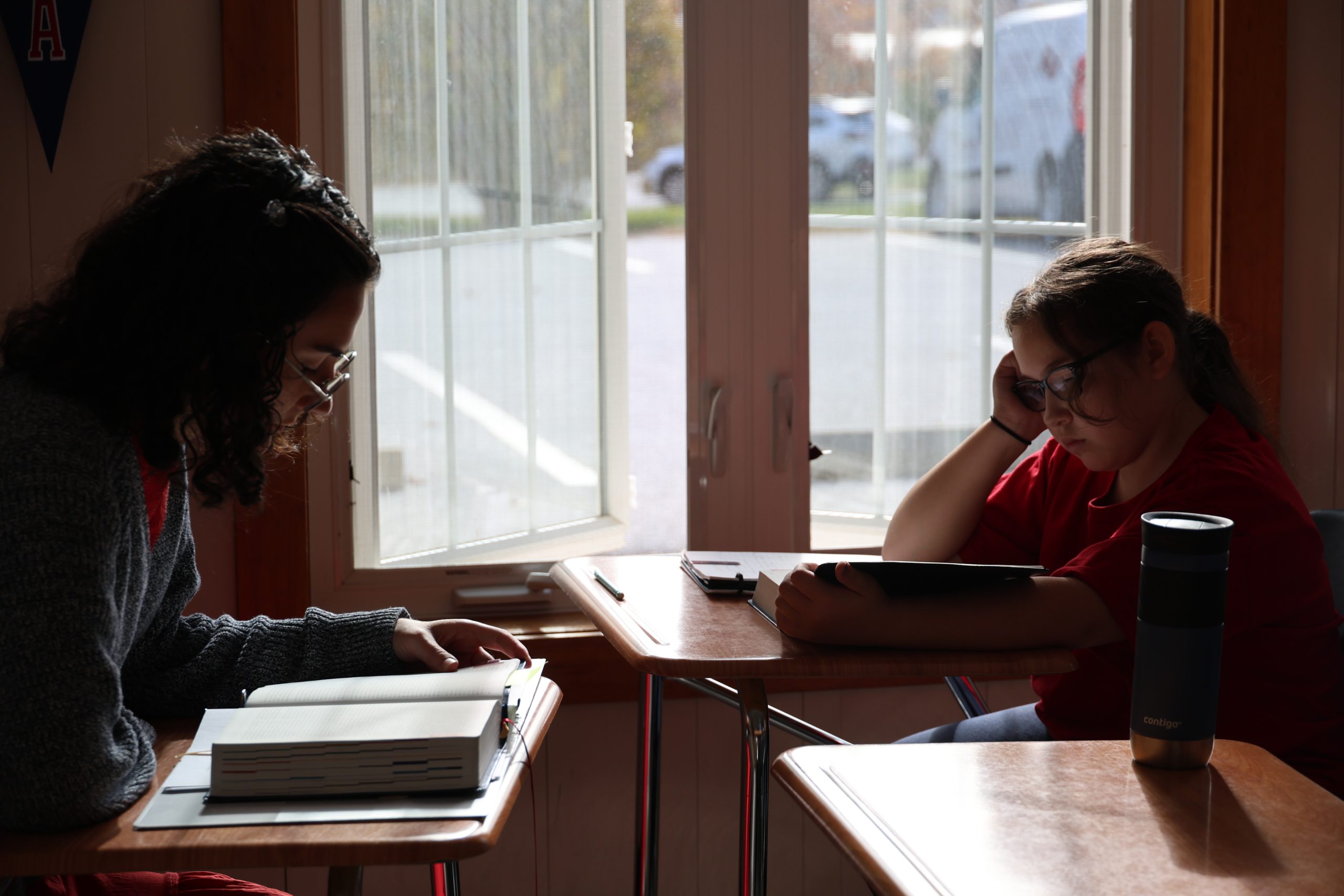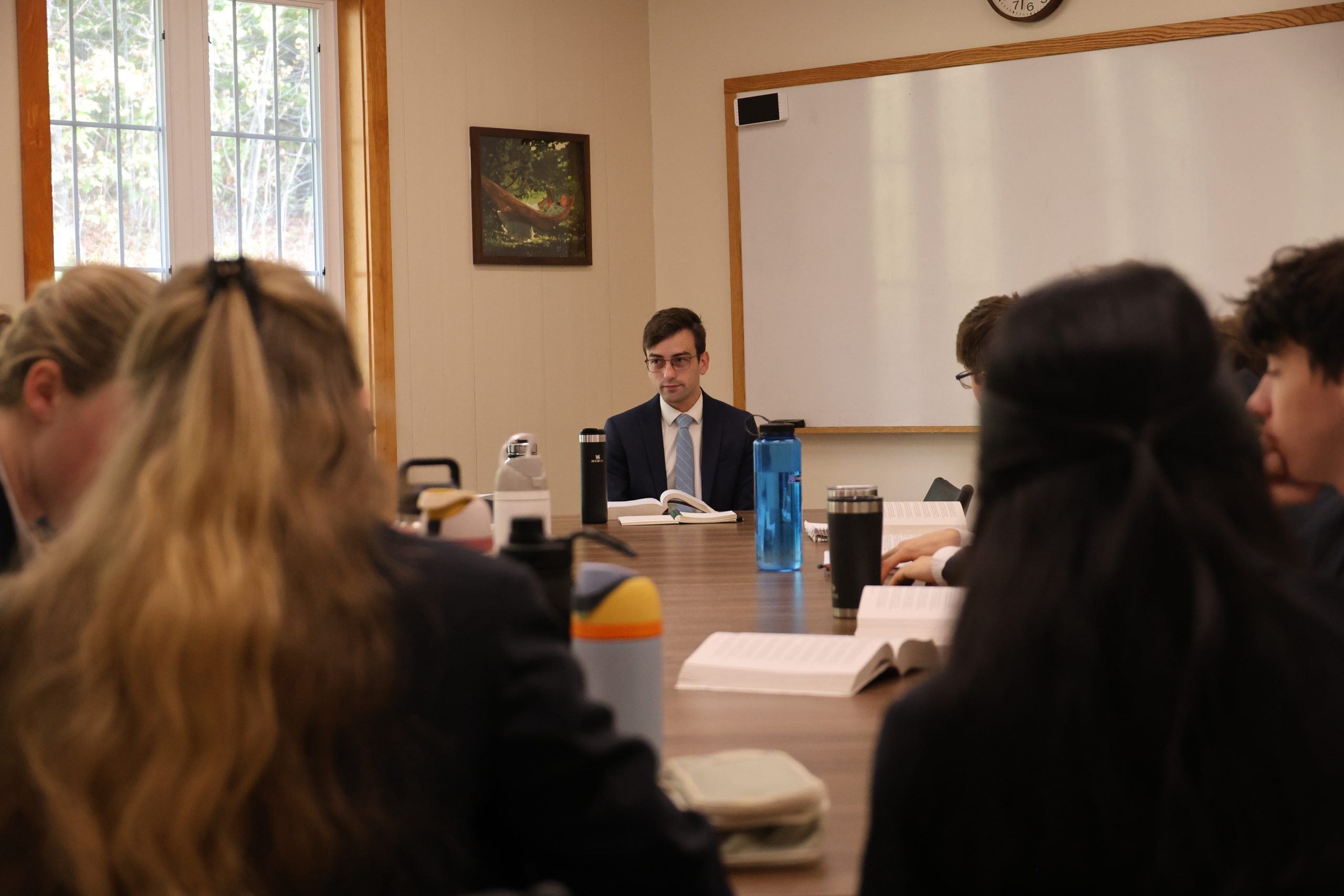Liberal Arts Education
The ultimate goal of high school is to prepare students to become what God is calling them to be. It is vitally important that high school students are exposed to a wide range of topics and fields of knowledge in order to make sure that every door remains open to them. A broad curriculum forms well-rounded students who are capable of positively impacting whatever social environment they enter. Teachers point students towards the magnanimous thinkers of the Western tradition while allowing students to discover the universal truths that have guided and shaped our modern world.
During the final phase of the classical curriculum – the “Rhetoric stage” – a high school student is challenged to write and speak with persuasion, clarity, and originality. Building upon the foundations and logic of the earlier stages, students learn how to express their observations of the truth and subsequent opinions with conviction and confidence. By this point, students are capable of discovering that all knowledge is in fact interrelated. Therefore, students will often study American literature alongside United States History. Students are also challenged to examine the relationship between two seemingly unrelated types of knowledge, such as science and theology (bio-ethics).
In the humanities subjects (literature, theology, and history), the Socratic method is the primary mode of instruction, whereby discussion is fostered through questioning. Students prepare for the class by completing required reading assignments and teachers aim to facilitate learning by capitalizing on the interest and passions of the classroom. Seating arrangements are typically circular in shape, thereby cultivating an atmosphere that is conducive to productive discussion.
Students must take six academic classes per year, as well as one fine arts elective and physical education. The school follows the esteemed Great Books tradition by reading and dialoguing with the best thinkers of Western Civilization. Seniors must complete a college-level essay, orally present their synthesis of themes and ideas learned, and then defend their essay in front of the entire high school student body and faculty.
| Subject | Grade 9 | Grade 10 | Grade 11 | Grade 12 |
|---|---|---|---|---|
| Theology | I: Foundations of Theology II: Christian Discipleship |
I: Old Testament II: New Testament |
I: Catholic Morality II: Catholic Social Teaching |
I: Faith and Reason II: Apologetics |
| Literature | Great Books I | Great Books II | Great Books III | Great Books IV |
| History | I: Ancient History II: Medieval History |
I: American Government II: Politics & US History I |
I: US History II II: US History III |
- |
| Latin | Latin II | Latin III | - | - |
| Humanities Electives | - | Politics; Economics; Humanities Seminar | Poetics; Introduction to Philosophy; Humanities Seminar | Classics; Business |
| Math | Geometry | Algebra II | Pre-Calculus | Calculus; Business Math; Statistics |
| Science | Biology | Chemistry | Physics | - |
| Fine Arts | Sacred Music, Art History and Art | - | - | - |
| Physical Education | Physical Education or Interscholastic Athletes | - | - | - |
This information is taken from our full Mount Royal Academy Humanities Canon. For the Great Books courses, each grade has several required readings, supplemented with with additional novels, short stories, and poems for teachers to choose from. This structure provides both stability and consistency to our curriculum, while allowing our teachers some creative liberty to teach from a place of passion.
| Category | Grade 9 | Grade 10 | Grade 11 | Grade 12 |
|---|---|---|---|---|
| Required | • Huckleberry Finn - Mark Twain • Out of the Silent Planet - C. S. Lewis • Julius Caesar - William Shakespeare • Romeo and Juliet - William Shakespeare |
• Pride and Prejudice - Jane Austen • My Ántonia -Willa Cather • The Winter's Tale - William Shakespeare |
• The Iliad - Homer • The Lord of the Rings - J. R. R. Tolkien • The Canterbury Tales (selections) - Chaucer • The Merchant of Venice - William Shakespeare |
• The Divine Comedy - Dante Alighieri • The Oedipus Cycle - Sophocles • Hamlet - William Shakespeare |
| Teacher Selection — Novels |
• Animal Farm - George Orwell • Beowulf - Anonymous • The Old Man and the Sea - Ernest Hemingway • The Pearl - John Steinbeck • The Hiding Place - Corrie ten Boom • Treasure Island - Robert Louis Stevenson • To Kill a Mockingbird - Harper Lee • Emma - Jane Austen • Jane Eyre - Charlotte Brontë |
• Murder in the Cathedral - T. S. Eliot • Oliver Twist - Charles Dickens • The Grapes of Wrath - John Steinbeck • The Scarlet Letter - Nathaniel Hawthorne • A Man for All Seasons - Robert Bolt • Dr. Faustus - Christopher Marlowe • A Day in the Life of Ivan Denisovich - Aleksander Solzhenitsyn • The Gulag Archipelago - Aleksander Solzhenitsyn • The Strange Case of Dr. Jekyll and Mr. Hyde - Robert Louis Stevenson • Frankenstein - Mary Shelley |
• The Song of Roland - Anonymous • The Poem of the Cid - Anonymous • Till We Have Faces - C. S. Lewis • The Great Divorce - C. S. Lewis • The Man Who Was Thursday - G. K. Chesterton • The Everlasting Man - G. K. Chesterton • The Odyssey - Homer • Death Comes for the Archbishop - Willa Cather • A Tale of Two Cities - Charles Dickens |
• Kristin Lavransdatter - Sigrid Undset • The Wreath - Sigrid Undset • The Aeneid - Virgil • The Oresteia - Aeschylus • The Death of Ivan Ilyich - Leo Tolstoy • The Betrothed - Alessandro Manzoni • Crime and Punishment - Fyodor Dostoevsky • 1984 - George Orwell • The Jeweler's Shop - Karol Wojtyła • The Great Gatsby - F. Scott Fitzgerald • Jayber Crow - Wendell Berry |
| Teacher Selection — Short Stories |
• Mythology (excerpts) - Edith Hamilton • All Summer in a Day - Ray Bradbury |
• Billy Budd - Herman Melville • Bartleby the Scrivener (and other short stories) - Herman Melville • The Raven - Edgar Allan Poe |
• The Selfish Giant - Oscar Wilde • The Happy Prince - Oscar Wilde • Song of Myself - Walt Whitman |
• Short stories (examples) - Flannery O'Connor • No Exit - Jean-Paul Sartre • The Plague - Albert Camus • Paradise Lost (excerpts) - John Milton |
| Teacher Selection — Poems |
• The Charge of the Light Brigade - Alfred Lord Tennyson • Break of Day - John Donne • The Second Coming - W. B. Yeats • In Flanders Fields - John McCrae |
• The Raven - Edgar Allan Poe • The Caged Skylark - Gerard Manley Hopkins • First Fig - Edna St. Vincent Millay • Ode to Silence - Edna St. Vincent Millay |
• Good Friday: Riding Westward - John Donne • Holy Sonnet 14 - John Donne • The Starlight Night - Gerard Manley Hopkins • In Praise of Solid People - C. S. Lewis • How Do I Love Thee? - Elizabeth Barrett Browning • She Walks in Beauty - Lord Byron |
• Paradise Lost (excerpts) - John Milton • The Ballad of the White Horse - G. K. Chesterton |
Below is a sampling of the foundational texts used in the high school Humanities elective courses.
| Introduction to Philosophy | Poetics | Humanities Seminar | Politics | Economics |
|---|---|---|---|---|
| • Meno - Plato • Euthyphro - Plato • Phaedo - Plato • Nicomachean Ethics - Aristotle |
• Understanding Poetry (4th ed.) • The Norton Anthology of English Poetry (3rd ed.) • The Complete Rhyming Dictionary |
• Rhetoric - Aristotle • Gorgias - Plato • The Elements of Rhetoric - Ryan Topping • The Art of Argument or Socratic Logic - Peter Kreeft |
• Politics - Aristotle • On Duties - Cicero • Treatise on Law - Thomas Aquinas • Leviathan - Thomas Hobbes • On the Social Contract - Jean-Jacques Rousseau • Second Treatise of Government - John Locke • Letter from Birmingham Jail and “I Have a Dream” Speech - Martin Luther King Jr. |
• On Social Justice (Popular Patristics) - St. Basil the Great • Wealth of Nations - Adam Smith • Economic Manuscripts of 1844 (The Communist Manifesto) - Karl Marx • Economics for Helen - Hilaire Belloc • Small Is Beautiful: Economics as if People Mattered - E. F. Schumacher |
Dual Enrollment
Juniors and seniors are eligible to receive college credits, thereby encouraging vocational discernment for life after Mount Royal Academy and reducing the cost of post-secondary education. Courses can be taken so long as the graduation requirements are fulfilled. These courses are offered on local campuses and online.
River Valley Community College
There are two programs available to high school juniors and seniors by virtue of MRA’s partnership is RVCC:
The Running Start Program allows high school students, in participating high schools, to enroll in RVCC courses taught at their own high school by their high school teachers. This dual-enrollment program provides students with both high school and college credit for these courses. College credits may be used towards completion of a degree, diploma, or certificate at this College or credits may be transferred to other colleges and universities throughout the country.(Please note that the determination of transfer credit is at the discretion of the receiving institution.)
Running Start Program students realize significant advantages: college credit awarded in high school, reduced tuition costs ($150 per course registration), reduced time to complete higher education requirements, and increased confidence in high school to college transition.
2. eStart
eStart is an online dual credit program that enables high school students to take community college courses for dual high school AND college credit. Courses offered through the eStart program are 100% online college courses.
- Earn high school and college credit for the same online course.
- Access your class anytime/anywhere to fit your busy schedule.
- Learn from highly qualified CCSNH faculty.
- Gain valuable experience with college coursework.
- Transfer credits to many colleges and universities.
- Save money – tuition is only $150 plus the cost of course materials.

